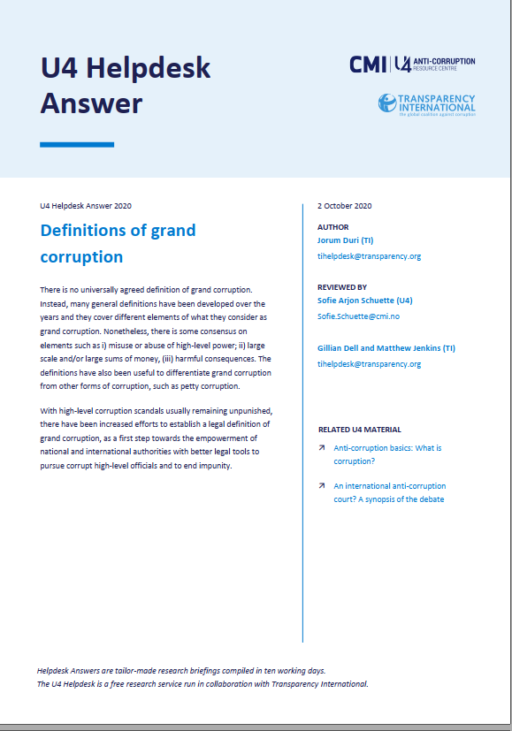
This Anti-Corruption Helpdesk brief was produced in response to a query from a U4 Partner Agency. The U4 Helpdesk is operated by Transparency International in collaboration with the U4 Anti-Corruption Resource Centre based at the Chr. Michelsen Institute.
Query
Please provide an overview of the most widely accepted definitions of “grand” corruption, and if there are any relevant advantages/disadvantages of the definitions. What other definitions (where possible, legal definitions) of corruption exist that might enable policymakers to distinguish between grand and petty corruption?
Summary
There is no universally agreed definition of grand corruption. Instead, many general definitions have been developed over the years and they cover different elements of what they consider as grand corruption. Nonetheless, there is some consensus on elements such as i) misuse or abuse of high-level power; ii) large scale and/or large sums of money, (iii) harmful consequences. The definitions have also been useful to differentiate grand corruption from other forms of corruption, such as petty corruption.
With high-level corruption scandals usually remaining unpunished, there have been increased efforts to establish a legal definition of grand corruption, as a first step towards the empowerment of national and international authorities with better legal tools to pursue corrupt high-level officials and to end impunity.
Contents
- Introduction
- General definitions of grand corruption
- Legal definitions of grand corruption
- Conclusion
- References
Main points
— Some general definitions of grand corruption agree on i) misuse or abuse of high-level power; ii) large scale and/or large sums of money, (iii) harmful consequences. These elements from general definitions have been useful when differentiating grand corruption from other forms of corruption, such as petty corruption.
— Recently, efforts have been made to establish a legal definition of grand corruption. For instance, Transparency International has worked on a draft legal definition, which was released in 2016 and revised in 2019.
— The main rationale behind efforts for a legal definition is to develop a criminal offence of grand corruption, as a first step towards the empowerment of national and international authorities with better legal tools to pursue corrupt high-level officials and to end impunity.
Authors
Jorum Duri, [email protected]
Reviewers
Sofie Arjon Schuette (U4 Anti-Corruption Resource Centre)
Gillian Dell and Matthew Jenkins (Transparency International)
Date
11/05/2021
Tags
 Download PDF
Download PDF
